‘Korean age’ could become a custom of the past
![A session of the National Assembly's legislation and judiciary committee is held on Wednesday. [KIM KYEONG-ROK]](https://koreajoongangdaily.joins.com/data/photo/2022/12/07/4b0b2bd3-7b30-4178-a175-0a356808da90.jpg)
A session of the National Assembly’s legislation and judiciary committee is held on Wednesday. [KIM KYEONG-ROK]
Korea will officially adopt the international method of counting ages starting as early as next year, moving away from its traditional system that adds at least a year.
A subcommittee of the National Assembly’s legislation and judiciary committee voted on revisions to the Civil Act and the General Act on Public Administration on Wednesday.
With the bill expected to be passed in a plenary session scheduled for Thursday and Friday, the new system will go into effect six months later.
Korea actually uses three age calculations: so-called Korean age, in which people are considered one-year-old at birth; the international system; and a scheme in which an individual grows one year older on the first day of the new year.
Under the so-called Korean age system, an individual turns one on the day they are born and gains a year on the first day of each new year. It is the most widely used calculation method.
The second is the globally recognized international system, where age is calculated by an individual’s birthday and the first birthday is celebrated 365 days after birth.
The third method calculates age by the year of birth, regardless of the month.
Based on these three different methods, Psy of “Gangnam Style” fame, for instance, who was born on Dec. 31, 1977, is 44 under the standard international system, 46 in Korean age and 45 under the year scheme.
Due to the confusion caused by this, President Yoon Suk-yeol pledged to adopt the standard international system of counting an individual’s age when running for president.
The bill passed by the committee Wednesday calls for a person’s age to be calculated and stated based on their date of birth.
Ages will be stated in months for infants who are less than a year old.
“There have been a lot of disputes and conflict when calculating and stating the age [in Korea],” said Rep. Yoo Sang-bum of the People Power Party (PPP).
“There was a controversy over the interpretation of age in [policies related to] labor, vaccinations and insurance contracts, and [the passage of the bill] is meaningful in that it presented a standard,” Yoo added.
BY SEO JI-EUN [seo.jieun1@joongang.co.kr]




















